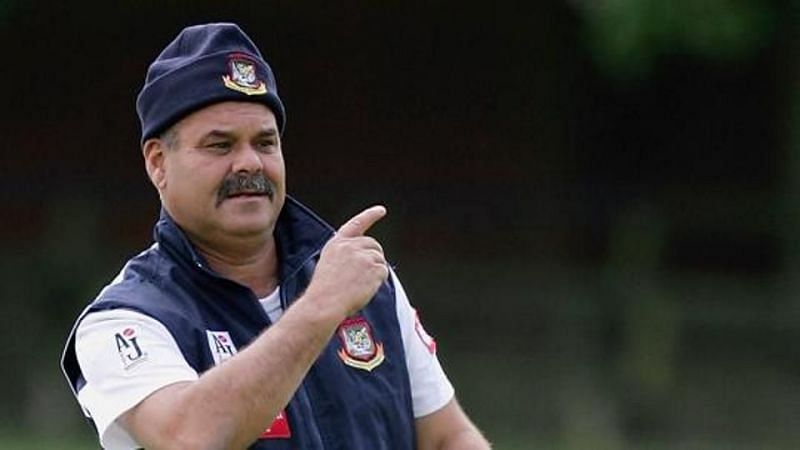
We see the product of somebody who was always destined for greatness: Dav Whatmore on Virat Kohli
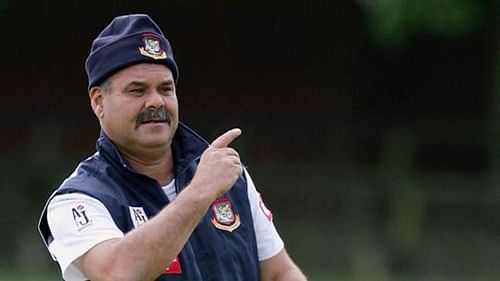
Winning a World Cup in his very first stint with an international team, building a team from scratch and making them compete with the best teams going around, winning the Asia Cup with his team in his very first assignment, becoming one of just two coaches (John Buchanan being the other) to win both the ICC World Cup and ICC Champions Trophy; the number of accolades this man has achieved as an international coach is unparalleled.
After the end of a playing career which consisted of seven Tests and one ODI for Australia and numerous matches for Victoria in the domestic circuit, Davenell Frederick Whatmore, also known as Dav Whatmore, took up the role of Sri Lankan cricket team's coach. At that time, the Lankans had a blank future when it came to cricket and the Sri Lankan-born Aussie, Whatmore, showed them the right path and helped the South Asian country win their first-ever World Cup within a few years of undertaking the role.
Soon after, he left Sri Lanka and moved to Lancashire and completed a double in 1998 by winning the National League and Natwest Trophy. He also went on to defend the National League crown in 1999 before returning to Sri Lanka and winning the ICC Champions Trophy in 2002 (shared the trophy along with India).
After tasting success with Lanka, he moved to their South Asian rivals Bangladesh in 2003, a time when Bangladesh posed no threat to teams in international cricket. He took his time, built a core and helped them win their first-ever game against India and Australia before helping them reach the second round of the 2007 World Cup by beating India in the group stage, something that is considered as the most monumental upset in Cricket World Cup history since the turn of the millennium.
Whatmore was later appointed as the director of the National Cricket Academy in Bangalore and did a fantastic job with the talents who trained there. Whatmore was given the duty of coaching Virat Kohli's Indian under-19 team in 2008, a team that won the under-19 World Cup in Malaysia.
Also read: 5 most impactful cricket coaches in modern era
A couple of years later, IPL franchise Kolkata Knight Riders, who were struggling to do well in the league, thanks to the innovative but weird strategies of former coach John Buchanan, hired the former Australian international as their head coach and that move paid rich dividends as he helped them finish fifth and third in the league table in the two years he was in charge of the team.
After resigning as the coach of the IPL franchise, Whatmore was appointed the coach of Pakistan and helped them win the Asia Cup in his very first assignment. However, he decided not to renew his contract with the Men in Green before the 2015 World Cup. Still, he was a part of the extravaganza as he coached Zimbabwe in the tournament but was sacked a year later with nine months remaining on his contract.
Since then, he has been spending his time in India where he started his own Cricket Academy, Dav Whatmore Cricket Academy, at Sri Ramachandra Medical College in Chennai whose main focus is on the developmental side. Adding to this, he was appointed the coach of the Kerala domestic team before the start of the season and helped them reach the quarter-final of the Ranji Trophy for the first time in their history.
Sportskeeda caught up with Whatmore, who has achieved almost everything a cricket coach possibly can, and discussed various things including the move to open the batting with Sanath Jayasuriya and Romesh Kaluwitharana in the 1996 World Cup, Virat Kohli, his academy and a lot more.
Here are the excerpts.
Q: Was becoming a coach your childhood dream or was it something that came your way at the later stages of your life?
I just wanted to be involved in the game. After my playing days, I felt comfortable being with the squad and helping others. As a child, you don't think of that (becoming a coach), you just want to play cricket. You just want to play for your country which I did. But when you start to get to retirement age, you start to think of your options and how you can stay in the game. You can't do that as a player. But, you can still stay in the game maybe as an umpire or an administrator or a coach. So, I went into coaching.
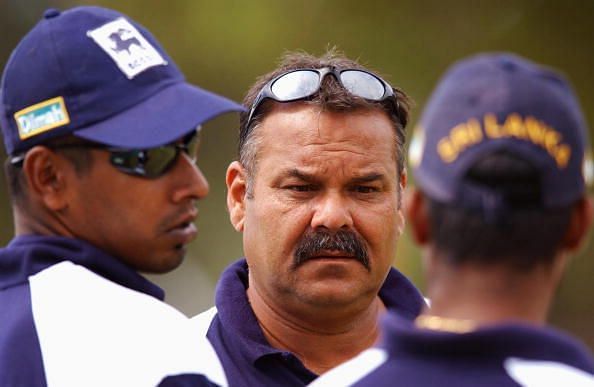
Q: In your first stint with an international team, you won the 1996 World Cup. The decision to open with Sanath Jayasuriya and Romesh Kaluwitharana was an innovation that changed the approach of teams in the field restriction overs in ODIs. What was the actual thought that paved the way for this decision?
The thought of opening with Kaluwitharana came from Duleep Mendis before the World Cup when we were playing in Australia. Immediately, I gave the move a try and saw huge benefits. I supported that and we began to put it into practice, and the rest is history. They were encouraged to go and play their game. The idea was not mine, but the manager Mendis' at the time.
Q: You were one of the godfathers of Bangladesh cricket. You were there when they first defeated India in 2003 and during the 2007 World Cup when they first qualified for the second round of the tournament. Where were they when you joined them in 2003 and where do you see them in 2017?
They were pretty down. When I came in 2003, most of the games were List A. There were a few Tests but mainly limited overs and also some matches against associates who we were not scared to play. We didn't shy away from them. That was at the start. The BCB had a decent grass root and high-performance structure. These were the brainchild of Mahbub Anam and it was in its infancy back then. Mahbub is a really good man. He started to encourage the young Bangladeshi players who were considered the future then. He promoted Mushfiqur Rahim and Shakib-al-Hasan, two of the main guys who debuted in international cricket while I was there.
They weren't winning and were playing mainly white ball cricket. We tried to play as many games as possible. Gradually, there was some improvement. Some of the wins were big ones and we began to create a nucleus of a reasonable team. Now, they have continued to develop physically, mentally and skillfully. They have their own BPL, a good U-19 competition and their A team is active. They've really put their money in the right area in terms of development and you can see the fruits of it coming up. It was a good experience for me as I was in Bangladesh for four years and got to mould a reasonably competitive group of players.
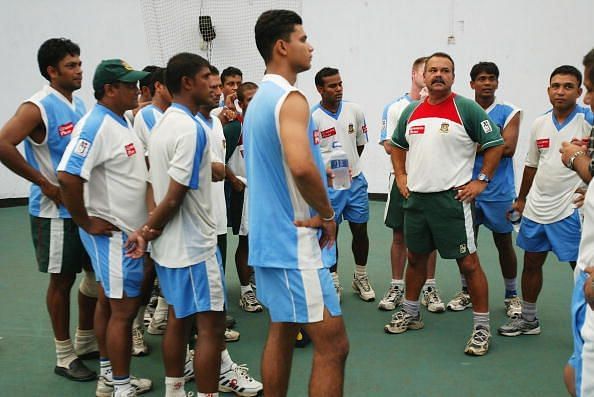
Q: When Pakistan were looking for a new coach, you were the favourite to land the job. But, Arjuna Ranatunga told them not to hire you. What actually happened between you both?
Nothing happened. I had a good relationship with him. Yeah well. I didn't ask him about that. I read it like you read it.
Q: You were the coach of India's under-19 team in 2008 when Virat Kohli led the team to victory. Almost a decade later, he has become easily the best batsman across all formats. What difference do you see between the Kohli of 2008 and the Kohli of 2017? How has he evolved as a player?
He has developed naturally. He's not really changed that much. He was confident, he had a good array of strokes, he was a leader and led from the front and was very physical in training. He didn't like losing. I think he's just developed in a normal way, something you would expect from a talented young player. He has a big emphasis on fitness which is a good thing. He's been given the responsibility as a leader and he's embraced that well. His performances, as a result, have not hampered that at all. It was always a case of when not if. I just expected him to develop given the support and encouragement that he got from DDCA and BCCI. Now we see the product of somebody who was always destined to be good.
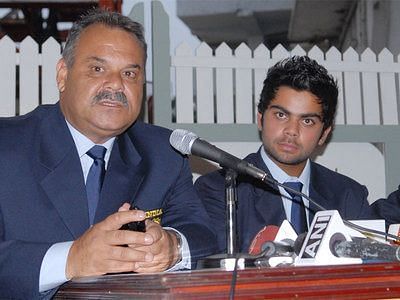
Q: You coached Pakistan against India in the past. Do you think both these teams should play bilateral series in the future?
I don't know. I just think players like to play cricket. The Indian players are bound by what they are told to do. The BCCI makes their decisions. I can't influence that. It would be nice in a perfect world if everyone was happy and playing each other but it is what it is. I sit and read like everyone else and see what the possibilities are of the neighbouring countries playing each other. At this moment, it is what it is and people just have to accept it.
Q: Zimbabwe cricket has been on a steady downfall of late. You coached them in the past and are probably aware of what they lack. What do they need to become a better team?
Any developing team always needs opportunities, they need to develop skills and have the other support areas in place. At the end of the day, you have to be playing and you have to identify which players have the chance of making it to the next level. It is up to the selectors to identify the right people who have the ability to take the next step. Then you need to give opportunities, confidence and put the support structures in place. It is not an easy fix, not a quick fix, but those are the main building blocks that would help all the developing players improve.
Q: Recently, you coached Kerala and helped them reach their first ever quarter-final in Ranji Trophy. What makes this team so special?
I think they possess a decent amount of skill. They are very good at what they do. They suffered from being in a place with lots of competition for too long. After playing in Group C (group for the Plate league teams in Ranji Trophy, does not exist anymore) all these years, the boys responded well and showed what they were capable of when they were given a chance. When they reached the quarters and had a golden opportunity to make further claims to be even better, they fell down flat on their faces and didn't do justice to what they are capable of. But it was a good season and the terrible game against Vidarbha would be worth it if we learn from it. If we don't learn from it, it won't be worth playing and losing the way they did. But, I have a feeling that we understand now that there are certain things we need to put right next season and make every effort to do that and get even better.
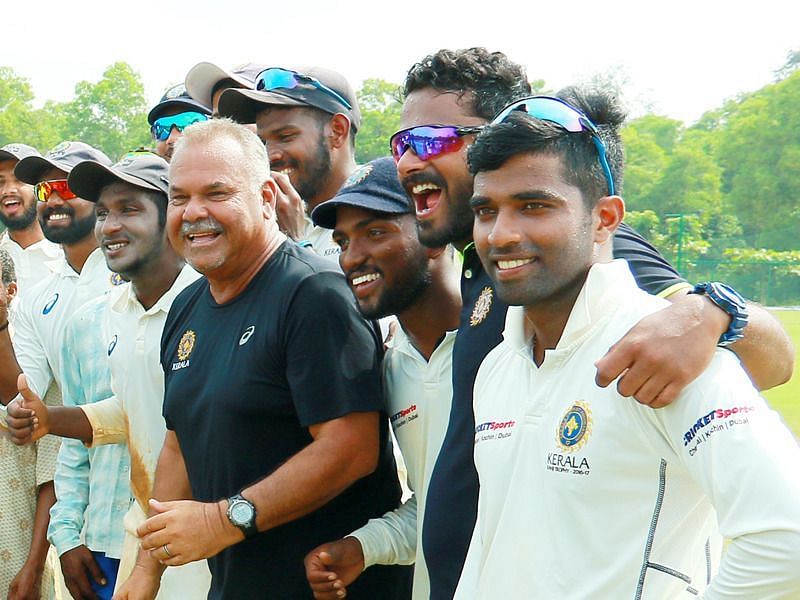
Q: Talking about Kerala, Basil Thampi made it to the Indian team for the series against Sri Lanka. What do you think of him as a player?
He has potential, there are no questions about that. He has got a lot of confidence from the IPL where he did well for Gujarat Lions. Now, he's got more exposure by playing in Duleep Trophy and Ranji Trophy matches where you bowl more than four overs. He has got a long way to go in the four-day formats but he has the attributes and tremendous potential to reach the top. Anybody looking at him will tell you how good he is. He also made a fifty that day as a night watchman against Haryana.
So, he's obviously got talent with the bat as well. But now what he needs to do is slowly understand a few of the things needed to do to play other formats. He needs to be a consistent performer before selectors come knocking in that format. But, obviously, he's got the ability to do well in T20s where he needs to bowl just four overs. Now, he's got the chance in international cricket to prove that.
Q: Your thoughts on the Dav Whatmore Cricket Academy in Chennai...
I came here for development mainly. Sri Ramachandra University and I started the Whatmore academy here not just for domestic players in India but also overseas players. It was a startup in April and it is something that has exceeded our expectations. It's grown in a very short period of time. JK Mahindra (he's been known to me for a while) was with me for a couple of years to think about moving into the development side of things. The timing was perfect for me to finish international coaching and begin the development side. We three got together and created something really good.
Afghanistan's under-19 team have been here twice. Nepal's senior team have been here as well. There'll be more opportunities for other teams to come here. We are expecting 50 odd boys from Dubai on 17th December for a series of matches. The facility here that we offer the students is not matched in most places, certainly not in India, and the information and coaching that they get from the coaches here, which includes Sanjay Mullasseri, a former Tamil Nadu coach, is second to none. It is a very healthy environment to learn. It will grow, there's no question.
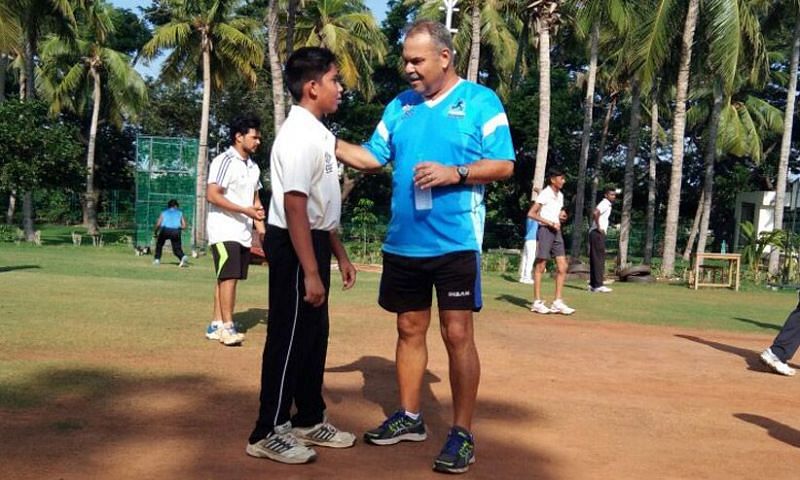
Q: What are the areas you emphasize on at the Dav Whatmore Cricket Academy?
Basically, what I do here at the academy is from a technical point of view. Boys and girls come here and they need to learn about skill and how to understand and execute the skills. Since we are dealing with people and not machines, communication is really important. It's how you get the message across. How you explain the movement pattern. How you get them to feel what the correct movement pattern in when showing them a particular skill.
That is supplemented from a theory point of view where we take them to a classroom and show them images of the correct way a particular skill is executed. They retain an imprint when you do it physically with coaches and also when you practice in the net. In the coaching part, you need to have a good command of the skill and also how you communicate it. That's very important.
Q: What does someone need to become a successful coach?
With teams, it's slightly difficult. You still need to have the knowledge of technique and also knowledge of tactical. It would be useful if you have played at a high level. Combined with all that it would be useful if you could communicate it effectively and manage individuals within a group. You are dealing with people, not machines. We all wear the same cap but under the cap, we are slightly different. Managing people becomes more and more important the higher you go. Let's not forget the support areas - the physical conditioning, the psychology, the mental skills etc. All these little areas assist in improving that person's performance.
Q: The memorable moments from your coaching career?
There are a number of things that have been nice to achieve. Various individual wins with lower teams. Bangladesh making it the super 8s was a big effort, unfortunately, India were beaten. But, that was a significant once. With Sri Lanka, I was a part of nine consecutive Test wins, with Pakistan winning the 2014 Asia Cup was great. Working in India, with the Knight Riders was also a memorable one. When I arrived there, they were pretty much at the bottom.
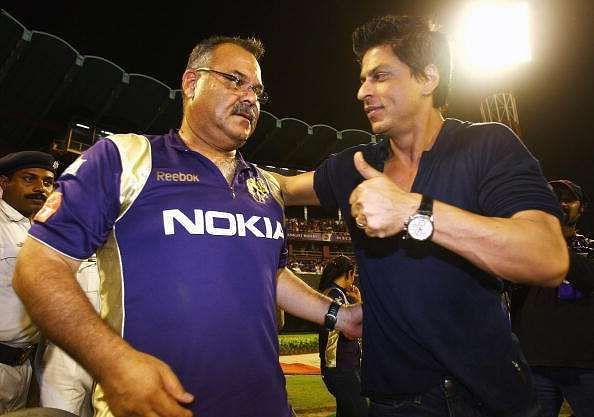
When I joined the team in the third edition, I inherited that group and we finished sixth, however, we were level with fourth. In the next edition, after a lot of work at the auction, we finished third. We were beaten by Mumbai Indians in the last game and played them again in the knockout and lost again. What I liked to see was the turnaround from a franchise that was struggling. It was good to see the smiling faces of the owners and everyone else who participated in those two years, particularly, the fourth edition.
Q: Any regrets?
I don't think so. I'd do the same things all over again. I am who I am. People have their opinions, but that's fine. I have my own way of doing things. Most of the time, I'm successful and sometimes, I'm not. But, overall, I think there were a lot more pluses than minuses.